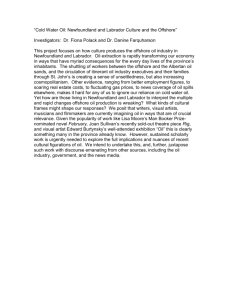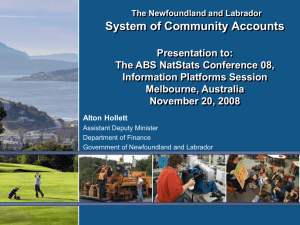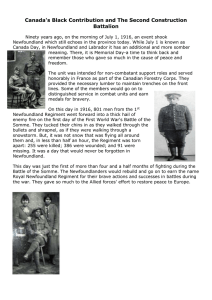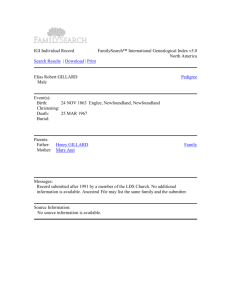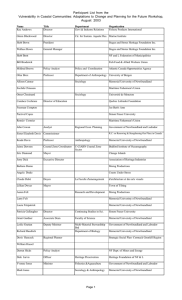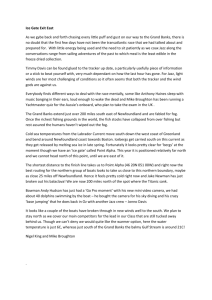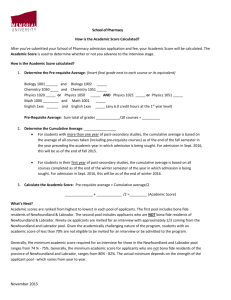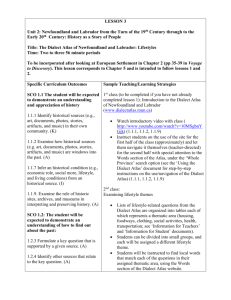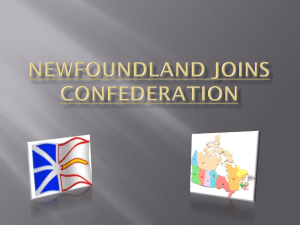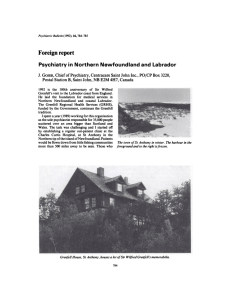Public Policy Research Centre Memorial University of Newfoundland
advertisement
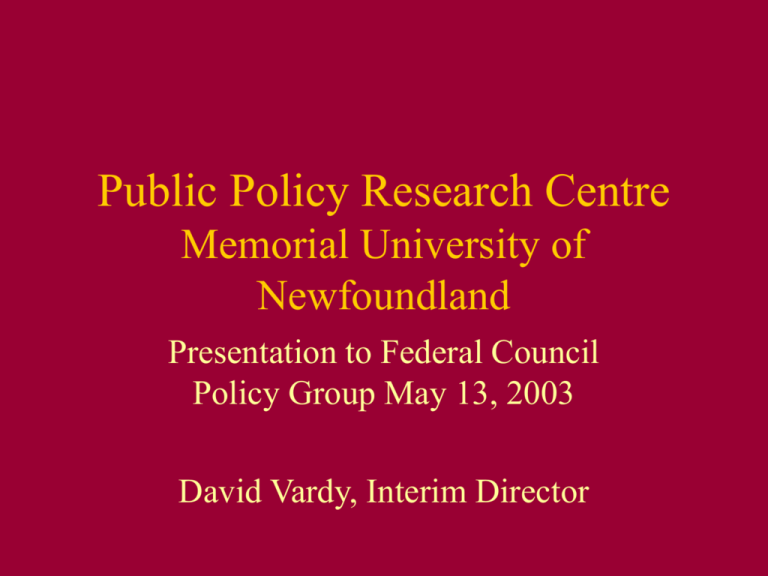
Public Policy Research Centre Memorial University of Newfoundland Presentation to Federal Council Policy Group May 13, 2003 David Vardy, Interim Director Profile of Director • • • • • • Economist Federal Service Provincial Service of 27 years as Deputy Minister Channing Chair and Adjunct Professor Task Forces and Panels Interim Director February 1, 2003 Future of Public Policy • Challenges and fundamental change in Newfoundland and Labrador • Strong policy capacity at national but not at provincial level • Cost of policy failure high – policy failure as cause of our unacceptable place in Canada • Need for made-in-Newfoundland solutions • Vision is important Pro-active versus Reactive • Vision leads to pro-active stance • University well-positioned to be pro-active • Research agenda important in pro-active model of governance Timing Propitious • Royal Commission Report Imminent • Election Imminent Why University Think Tank? • University Strategic Plan makes commitment to public policy research • National funding councils demand policy relevance • Wide and diverse range of multidisciplinary expertise at University • Respected Institution in Province Target audience • • • • Governments Leaders General Public Public support generates government action The Need for a Policy Centre: Memorial’s Strategic Plan • Making our policy-related expertise accessible. • Excellence in research and community service. • Innovative leadership in developing and applying knowledge and values. • Responsive to Newfoundland and Labrador's geography, culture and economy. Getting Started • The Public Policy Research Centre gratefully acknowledges the advice and financial assistance of the Atlantic Canada Opportunities Agency Policy Centre Mission Statement • The Policy Centre will enhance social and economic public policy in Newfoundland and Atlantic Canada through collaborative research and capacity development. Policy Centre Research Focus: Social and Economic Development • Natural resource management • Optimizing participation of local economies in natural resource development • Seeking linkages between old and new economies • Identifying best-practice strategies for regional development. Centre’s Collaborative Commitment • to identifying questions for research and analysis with policy makers and policy advisors at all levels of govt.; • to working with research centres and funding agencies regionally, nationally and internationally that have similar mandates; • to responsible, scientific and timely research; • to communicating results so as to help policy makers make the best possible decisions. Policy Centre Location 4th Floor, Queen’s College Memorial Main Campus Policy Centre Organization University President Vice-President (Research and International Relations) Dean of Arts Policy Centre Director Policy Centre Advisory Board Advisory Board: MUN Members • • • • Chris Loomis, Chair, VP (Research) David Graham, Dean of Arts Chris Dunn, Department of Political Science David Vardy, Interim Director Advisory Board: Community Members • June Alteen, Chairs School District 3 & Steering Committee of the Social Strategic Plan for the Grenfell Cormack Region • Douglas Brown, Inst. of Intergovernmental Relations, Queen’s U. • Keith MacDonald, Manager of Policy and Planning, ACOA • Andy Noseworthy, Deputy Minister of Intergovernmental Affairs, Govt. of NF and Lab. • Elaine Price, President, NF and Lab. Federation of Labour • William Wells, President and and CEO, Newfoundland Hydro Policy Centre Working Papers • Timber and Non-Timber Forest Products: Changing Policy in Newfoundland and Labrador (Susan Williams) • The Irish Economic Model and Federal Transfers in Canada (Stephen White) Policy Centre Projects • • • • Strategic Social Partnerships Dynamics of Rural Areas Economic Impact of Offshore Petroleum Royalty Regimes and the Economic Future of Newfoundland Dissemination and Networking Activities • public lecture series (e.g., Galbraith Lecture) • exchange visits by researchers or policy makers • web site, ‘occasional paper’ series, roundtables, workshops, conferences • joining national and international policy research networks • annual prize for the best graduate thesis or MA project report in public policy Curriculum Development to support Public Policy Capacity • Executive Masters in Oil and Gas Studies • Public Sector Leadership and Management Development Program • Masters in Health Systems Management Capacity Development • Centre draws upon faculty • Influence on new appointments • Build policy-relevant expertise Review Panel • • • • • • ACOA funding two years Contract up to December 31, 2004 Review required Panel appointed in September, 2002 Panel to examine future prospects of centre Report in December 2002 Panel Members • Keith Banting, Director of Policy Studies at Queen’s • Philip Prince, President, Canadian Energy Research Institute, (CERI) • Noel Roy, Professor,Economics Department at MUN • David Vardy, Chair of Panel Review process • • • • • University input Government input Community organizations Site visit Collaborative writing process Recommendations • • • • • • Centre to continue, subject to funding Necessary funding identified Focus upon fundamental issues No restriction on mandate Rolling agenda Strong interaction with other centres Recommendations (continued) • University to provide space and overhead cost plus some contribution to salaries • Core funding from both Province and Federal Government • Project funding from variety of sources • Transitional Arrangements Recommendations (continued) • Core faculty participants identified • Strong engagement of faculty in planning • Research to result in peer-reviewed publication • Core executive team of three • Board of Directors to replace advisory committee Status of report • Board of Regents have report • Interim Director appointed • ACOA extension Research Agenda • • • • Royal Commission report imminent Policy Centre offer to host workshops Process to establish research priorities Vision without ideology Vision • • • • Innovation Theme Knowledge based Healthy Communities Sustainable Development Principles or criteria • Relevance in terms of innovation, employment, public debt, sustainability • Potential application to other areas • Builds upon strengths • Multi-disciplinarity – embracing wide range of expertise • Timeliness Principles (continued) • • • • Options Evidence and theory Existing work – no duplication Use of people with highest level of expertise • Network with other centres Research agenda setting • Start with broad fields • Policy forum to review • Policy forum to pick immediate priorities and identify selected fields • Consultation process to build medium term research agenda Build upon Royal Commission work • • • • • • Demographic trends Regional and rural Development Entrepreneurship Fiscal Federalism New economy Innovation Broad Fields 1. 2. 3. 4. 5. Renewable resources Non-renewable resources Education, health, human resources Governance issues People, Places, Transportation and Technology Renewable Resources • • • • • • • • Fisheries and aquaculture Forestry Agriculture Hydroelectric resources Coastal zone management Environment Waste Management Reinvention of old industries Non-Renewable Resources • • • • • • Petroleum Minerals Issues of sustainability Supplier development and local benefits Royalty Revenue Balance between economic rent and direct regional benefits • Reinvention of old industries Education, Health, Human Resources and Culture • • • • • • • • Labour Relations Occupational Health and Safety Income Support Social determinants of economic progress Economic and social adjustment Prepare youth for new economy Adult literacy/new economy Culture Governance Issues • • • • • Women in society Aboriginal issues Dispute settlement Provision of local services Fiscal federalism and intergovernmental cooperation • Social capital and volunteer sector People, places, transportation and technology • • • • • Communities and demography / Rural - Urban Location of economic activity Labrador issues Economic and social Adjustment to resource crises Transportation and communication and social infrastructure • Research and innovation • Manufacturing and trade • Investment capital Agenda setting • • • • • • Policy forum to select one or two projects Royal Commission report timely Policy forum to select two broad fields Consultation process to follow Themes and research projects identified Seek project funding Building Public Policy Centre • Requires major commitment by University from top down • Transformation of University • Broad base of support in community required • Difficult challenge requiring significant commitment of energy • Full time director needed (not part time) Funding for Centre • • • • • Core and Project funding Private sector Foundations Federal Provincial government Balance of expertise • • • • Canada Research Chair Interchanges/Visiting Fellows Research Staff/ Senior and junior Post/Doctoral Relationship to other centres • • • • ISER/Smallwood Centre for Applied Health Research PRAC Regional and Rural Studies Board of Regents • Assess funding situation • Make decision to proceed • If positive, then appoint new Board of Directors and recruit new Director and Associate Director in early fall Contact David Vardy Interim Director Public Policy Research Centre Memorial University of Newfoundland St. John's, NF, CANADA A1C 5S7 Tel. 709-737-4311 Fax 709-737-2041 e-mail dvardy@mun.ca
